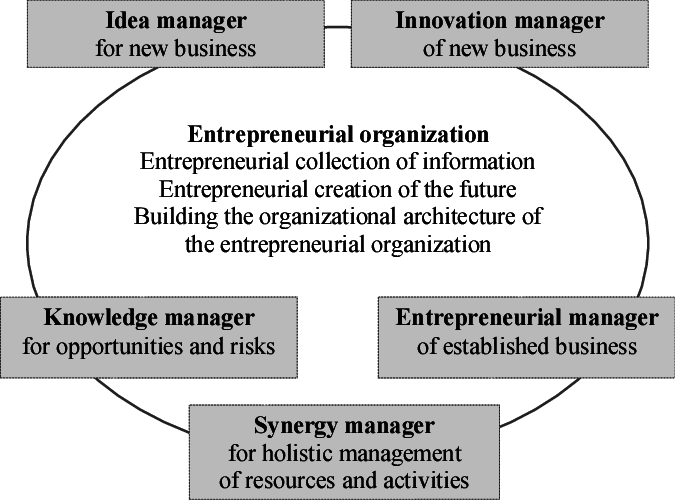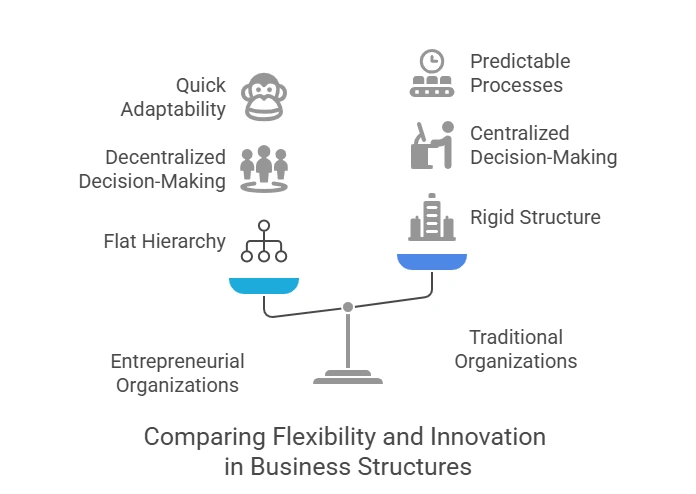Entrepreneurial organizations play a significant role in driving economic growth, with statistics highlighting their impact on job creation and innovation. According to the Global Entrepreneurship Monitor (GEM), in 2020, around 13% of adults globally were involved in early-stage entrepreneurial activities, demonstrating the widespread interest in starting new ventures.
In the United States, the Small Business Administration (SBA) reports that small businesses, which often embody entrepreneurial structures, employ nearly 47.5% of the private workforce. Furthermore, studies show that entrepreneurial organizations contribute to a substantial portion of new patents and technological innovations, furthering industries such as technology and healthcare.
Despite facing challenges like funding access and market competition, entrepreneurial organizations continue to be key drivers of job creation, economic diversification, and global competitiveness.
- Entrepreneurial Organization Meaning
- Entrepreneurial Organization Structure
- Key Characteristics of an Entrepreneurial Organization
- Entrepreneurial Organization Examples
- How to Foster an Entrepreneurial Organization Culture
- Final Thoughts on Entrepreneurial Organizations
- Resources for Aspiring Entrepreneurial Organizations
- FAQ – Entrepreneurial Organization
Entrepreneurial Organization Meaning
An entrepreneurial organization is a dynamic entity that thrives on innovation, adaptability, and growth. Organizations must be agile, innovative, and forward-thinking to stay competitive. This is where entrepreneurial organizations come into play. An entrepreneurial organization is one that embodies the principles of entrepreneurship—embracing innovation, adaptability, and risk-taking—to drive growth and success.
Unlike traditional firms with rigid hierarchies and established protocols, these organizations thrive on flexibility and empower employees to think creatively and take initiative. The picture below explain the role model for an entrepreneurial organization.
 Credits: Leon Pretorius
Credits: Leon Pretorius
At their core, entrepreneurial organizations foster a culture of creativity and calculated risk-taking. As industries evolve rapidly due to technological advancements and shifting consumer demands, companies that fail to innovate risk becoming obsolete. Entrepreneurial organizations, however, are designed to navigate uncertainty, seize opportunities, and remain resilient in the face of change.

Entrepreneurial Organization Structure
At its core, an entrepreneurial organization is one that operates with an entrepreneurial mindset, continuously seeking opportunities for innovation, adaptation, and growth. Unlike traditional organizations that rely on rigid structures and predictable processes, entrepreneurial organizations embrace change, encourage experimentation, and foster a culture of proactive problem-solving.
An entrepreneurial organization structure is typically characterized by a flat hierarchy and a focus on flexibility and innovation. In such a structure, decision-making is often decentralized, allowing individuals or small teams to have more autonomy and take initiative. This approach is common in startups and small businesses where quick adaptability and creative problem-solving are essential for growth.

The emphasis is on collaboration, with leadership often being more informal and hands-on, guiding the organization through its growth stages. This structure fosters an entrepreneurial spirit by encouraging risk-taking, innovation, and a sense of ownership among employees, which can be crucial for a company’s long-term success in dynamic markets.
They operate with a decentralized structure, allowing for swift decision-making and flexibility in responding to market demands. By prioritizing innovation and continuous improvement, these organizations position themselves for long-term success in competitive industries.
Key Characteristics of an Entrepreneurial Organization
Entrepreneurial organizations stand out due to their dynamic nature and strategic approach to business growth. In an era where market trends, consumer demands, and technological advancements shift rapidly, businesses that fail to evolve risk being left behind. Their willingness to evolve ensures long-term sustainability and relevance.
Entrepreneurship is neither a science nor an art. It is a practice.— Peter Drucker.
What sets these organizations apart? Key characteristics that define them include a strong innovation culture, decentralized decision-making, a proactive and risk-taking mindset, and a commitment to continuous improvement.
Innovation and Adaptability
Innovation and the ability to adapt quickly are the lifeblood of an entrepreneurial organization. These companies prioritize creative thinking, research, and development, ensuring that new ideas are consistently explored and tested.
They continuously seek new ideas, products, services, and business models to stay ahead of competitors. By fostering a culture of creativity and encouraging employees to experiment, these organizations remain adaptable to shifting market demands and technological advancements.
Decentralized Decision-Making
A defining trait of entrepreneurial organizations is their flat and flexible structure, which allows for faster decision-making. Unlike traditional hierarchical models where decisions are made at the top, these organizations empower employees at all levels to take initiative.
This decentralization enhances responsiveness, agility, and innovation, ensuring that opportunities are seized without bureaucratic delays. They invest in cutting-edge technology, embrace digital transformation, and foster an environment where employees feel empowered to challenge the status quo.

Risk-Taking and Proactiveness
Entrepreneurial organizations don’t just react to market changes—they anticipate them. By staying ahead of industry trends, leveraging data-driven insights, and encouraging risk-taking in a calculated manner, these organizations set themselves apart as market leaders. Their ability to evolve ensures they remain competitive, relevant, and ready for the future.
Instead of fearing uncertainty, they embrace risk as an opportunity for growth. Leaders encourage teams to explore bold ideas, test new strategies, and learn from failures, and capitalize on emerging opportunities before competitors do. This proactive approach enables them to stay ahead in competitive markets, seize emerging opportunities in an ever-evolving market, and pivot when necessary.
Strong Entrepreneurial Orientation
Beyond adaptability and innovation, growth is a central focus. Successful entrepreneurial organizations exhibit a high degree of entrepreneurial orientation, which includes three core elements:
- Innovativeness – The drive to develop new solutions and disrupt industries.
- Risk-Taking – The courage to invest in untested ideas with high potential returns.
- Proactiveness – A forward-thinking approach to identifying and exploiting opportunities before competitors do.
By fostering these traits, entrepreneurial organizations not only survive but thrive in competitive markets, shaping the future of business and industry. These elements work together to create a company that is agile, competitive, and future-focused.
Supportive Culture
A collaborative and open culture is essential for entrepreneurial success. These organizations prioritize:
- Open communication, where employees feel heard and valued.
- Teamwork and cross-functional collaboration, fostering a sense of shared purpose.
- A creative mindset, where new ideas are encouraged and rewarded.
By nurturing an environment that supports experimentation, continuous learning, and innovation, entrepreneurial organizations create a workplace where employees feel empowered, motivated, and driven to contribute to success.
Entrepreneurial Organization Examples
Both Amazon and Google showcase how an entrepreneurial mindset, characterized by continuous innovation, adaptability, and proactive decision-making, can fuel growth and market dominance. Their success lies in their ability to evolve with the times, take risks, and foster a culture that empowers employees to drive change and create the future.
An entrepreneur is someone who jumps off a cliff and builds a plane on the way down.— Reid Hoffman.
Amazon
Amazon is a prime example of an entrepreneurial organization that has successfully embodied the spirit of innovation and adaptability. From its humble beginnings as an online bookstore, Amazon has transformed into one of the world’s most influential companies, continuously diversifying its offerings and expanding into new markets.
- Innovation
Amazon constantly innovates, introducing new technologies such as Amazon Web Services (AWS), which revolutionized cloud computing, and the Amazon Prime membership, offering added convenience for consumers. - Adaptability
The company quickly adapts to changing market demands, as seen in its shift to e-commerce dominance and rapid expansion into areas like entertainment (Prime Video), smart devices (Alexa), and even grocery retail (Whole Foods). - Risk-Taking and Proactiveness
Amazon’s willingness to invest in emerging technologies, like drone delivery systems and artificial intelligence, exemplifies its commitment to calculated risk-taking to secure long-term growth.
Amazon’s decentralized decision-making structure, where individual teams and divisions have the autonomy to innovate, has fostered its remarkable ability to stay ahead of competitors in the fast-moving tech space.
 Credits: Statista
Credits: Statista
Google, now part of Alphabet, is another leading entrepreneurial organization renowned for its innovative culture and forward-thinking strategies. The company’s ability to pivot from its core search engine business to ventures in artificial intelligence, self-driving cars, and health technologies has established it as a global leader.
- Innovation
Google is synonymous with innovation, constantly developing new products and services such as Google Maps, Google Cloud, and Android. The company’s “20% time” policy, which encourages employees to spend a portion of their time on personal projects, has led to some of its most successful products. - Risk-Taking
Google is not afraid to take significant risks, as demonstrated by its investments in moonshot projects like Waymo (self-driving cars) and Google Glass, even if these projects face early-stage failures. - Proactiveness
Google has consistently been ahead of the curve, moving quickly to dominate the digital advertising space, creating new business models, and driving global technological change.
Google’s culture of collaboration, open communication, and emphasis on employee autonomy makes it a perfect example of an entrepreneurial organization where individuals are encouraged to think big and push boundaries.
 Credits: Statista
Credits: Statista
How to Foster an Entrepreneurial Organization Culture
Fostering an entrepreneurial culture requires a multi-faceted approach that encourages creativity, embraces risk, and provides resources for growth. By promoting innovation, fostering open communication, encouraging risk-taking, and offering the necessary tools, organizations can create an environment where entrepreneurial spirit thrives, leading to sustained growth and success.
1. Encourage Employees to Think Creatively
Promoting Innovation! At the heart of every entrepreneurial organization is innovation, and creating an environment where employees feel empowered to think creatively is essential. To foster innovation, organizations can:
- Encourage experimentation by allowing employees to explore new ideas, even if they fail.
- Create innovation hubs or dedicated time for brainstorming and collaboration, similar to Google’s “20% time” or 3M’s innovation lab.
- Recognize and reward creative thinking to motivate employees to continue pushing the boundaries of conventional thinking.
By celebrating new ideas and offering employees a platform to share their innovations, organizations can tap into a wealth of untapped creativity and discover game-changing solutions.
2. Create an Environment Where Ideas Can Flourish
Fostering Open Communication! Open communication is key to any entrepreneurial culture. When communication channels are transparent and collaborative, ideas can flow freely and evolve organically. Ways to foster open communication include:
- Regular brainstorming sessions where employees at all levels can contribute their thoughts without fear of judgment.
- Leadership transparency, where leaders share company goals, challenges, and successes with the team, encouraging feedback and discussion.
- Cross-functional teams, where diverse perspectives lead to better solutions and more innovative approaches.
By creating an environment of trust where employees feel heard, organizations can boost idea generation and develop solutions that may not have emerged otherwise.

3. View Failures as Opportunities for Learning
Encouraging Risk-Taking! One of the hallmarks of entrepreneurial organizations is their willingness to take risks. Embracing risk is crucial for growth and innovation. However, to encourage risk-taking, organizations must shift the focus from the fear of failure to learning from mistakes. This can be done by:
- Celebrating calculated risks by recognizing employees who push boundaries and test new ideas, even if they fail.
- Viewing failure as a stepping stone and an opportunity to learn and improve, not as a setback.
- Offering a safe space for experimentation, where employees can fail without fear of punishment or negative repercussions.
By rewarding bold ideas and normalizing failure, organizations can create a culture where risk-taking becomes second nature, driving the company forward.
4. Train and Support to Nurture Entrepreneurial Skills
Providing Necessary Resources! To ensure employees have the tools and knowledge to foster an entrepreneurial mindset, organizations must provide the necessary resources and support. This includes:
- Offering training programs on entrepreneurship, innovation, and risk management.
- Providing access to mentorship or industry experts who can guide employees through the challenges of developing new ideas.
- Investing in technology and tools that enable employees to experiment, prototype, and bring their ideas to life.
By equipping employees with the right skills and resources, organizations not only nurture an entrepreneurial culture but also build a workforce capable of driving long-term success through innovation and adaptability.
Final Thoughts on Entrepreneurial Organizations
Entrepreneurial organizations play a crucial role in ensuring long-term success and sustainability. By embracing innovation, adaptability, and growth, these organizations can quickly respond to market changes and maintain a competitive edge.
According to ASBN, recent data indicates that globally, there are approximately 582 million entrepreneurs. In the United States, small businesses, which are integral to the entrepreneurial landscape, created 1.5 million new jobs annually. However, challenges persist, as two-thirds of startups fail within ten years, highlighting the need for robust support systems for entrepreneurial organizations.
The key characteristics of entrepreneurial organizations—innovation, decentralized decision-making, risk-taking, and a supportive culture—empower them to stay ahead of the curve, anticipate trends, drive and adapt to new business opportunities. These traits allow entrepreneurial organizations to build resilience, enabling them not only to survive but thrive in the face of challenges.
As businesses continue to navigate an increasingly complex and competitive world, adopting an entrepreneurial mindset is no longer optional or just for startups—it’s the key to sustained success for businesses of all sizes in the modern world.

Resources for Aspiring Entrepreneurial Organizations
For aspiring entrepreneurial organizations looking to grow and thrive, there are numerous online resources that provide essential tools, mentorship, and educational content. These resources can guide you in building a successful entrepreneurial organization by offering insights into best practices, funding opportunities, and networking.
Utilizing the following platforms can help you stay informed, improve your business model, and connect with other entrepreneurial organizations globally. Connections make changes and transform lives.
- Global Entrepreneurship Monitor (GEM)
GEM offers in-depth reports on global entrepreneurial activity, helping entrepreneurial organizations understand trends and challenges in various markets. It’s an invaluable tool for identifying growth opportunities in your entrepreneurial organization. - Small Business Administration (SBA)
The SBA provides resources such as grants, loans, and advice specifically designed for small businesses and entrepreneurial organizations in the United States. It’s an excellent platform to help secure funding and grow your organization. - Entrepreneur.com
This online publication is a go-to resource for entrepreneurial organizations, offering articles, advice, and success stories to inspire and guide new ventures. It’s particularly helpful for practical tips and strategies. - Kauffman Foundation
The Kauffman Foundation supports entrepreneurial organizations by providing educational programs, research, and events focused on entrepreneurship. Their resources are perfect for entrepreneurs looking to scale their business and increase their impact.
FAQ – Entrepreneurial Organization
What is an enterprising organization?
An enterprising organization entrepreneurial focuses on identifying new opportunities, taking risks, and fostering innovation. Such an organization entrepreneurial mindset ensures businesses remain competitive by constantly seeking growth and adopting forward-thinking strategies.
What is an intrapreneurial organization?
An intrapreneurial organization encourages employees to take initiative and develop new ideas, fostering innovation within the company. This type of organization entrepreneurial structure boosts creativity and drives internal growth by empowering teams to act as entrepreneurs.
Can a large organization be entrepreneurial?
Yes, large organizations can adopt an entrepreneurial mindset by creating a culture of innovation, fostering collaboration, and decentralizing decision-making. By empowering employees and encouraging risk-taking, even established companies can successfully foster entrepreneurship and remain adaptable to market changes.
What makes an organization entrepreneurial?
An entrepreneurial organization is one that prioritizes innovation, adaptability, and growth. These organizations embrace a flexible structure, decentralized decision-making, and a culture that encourages risk-taking and creativity, allowing them to stay competitive in a constantly evolving marketplace.
How can I tell if my organization is entrepreneurial?
If your organization values innovation, encourages creative problem-solving, allows for decentralized decision-making, and rewards risk-taking and experimentation, then it likely operates with an entrepreneurial mindset. A supportive culture where employees are empowered to take ownership and drive change is another indicator.




















0 Comments